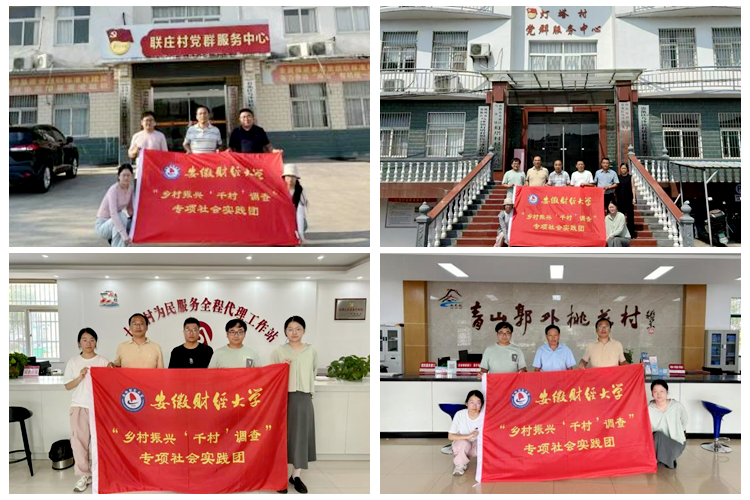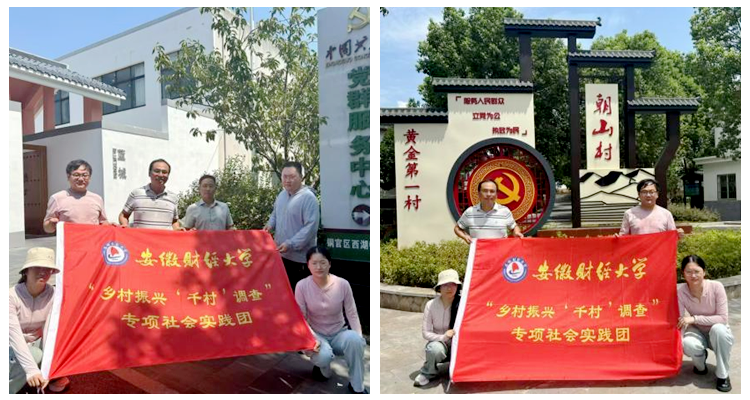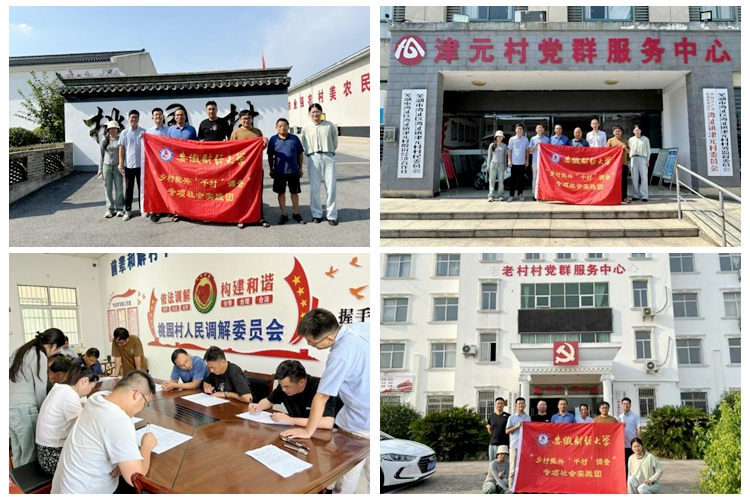To better guide young scholars into the frontlines of rural revitalization, from August 8 to 11, professors Yang Yejun, Cui Lianbiao, Zhou Yuanxiang, and Bao Bingfei, along with a team of graduate research students, conducted a questionnaire survey on rural revitalization in Wuhu, Huainan, Tongling, Chizhou, and Ma'anshan. This research endeavor aimed to gain insights into the current state of rural development, explore effective paths for rural revitalization, and simultaneously inspire innovative thinking and social responsibility among young scholars.
In Taoyuan, Jinyuan, and Laocun Villages of Wanzhi Town, Wuhu City, the research team learned through conversations with village party secretaries that local economies had diversified through characteristic agriculture and rural tourism. Taoyuan Village developed an integrated eco-industry encompassing ecological agriculture, land greening, tourism, and leisure fishing by land circulation and contracting, forming a comprehensive tourism industrial chain with local tourism resources. Jinyuan Village promoted rural tourism by establishing cherry blossom appreciation and science popularization bases, driving related industries and generating income for villagers while broadening employment opportunities. Laocun Village achieved remarkable results in promoting livable rural construction during its rural revitalization efforts.

In Nonglin and Chaoshan Villages of Xihu Town, Tongling City, green agriculture and eco-tourism facilitated a win-win scenario for both the ecological environment and economic benefits. Based on beautiful countryside construction, Nonglin Village developed modern agriculture, transforming traditional agriculture into new tourism formats such as farming experiences, folk customs, and specialty homestays. Simultaneously, it advanced rural collective economic reforms to strengthen village-level collective economies. Chaoshan Village, leveraging its gold industry and rich historical and cultural resources, introduced health care, elderly care, and rural cultural tourism industries, creating unique highlights in its rural revitalization endeavors.

Lianzhuang and Dengta Villages in Wusha Town, Chizhou City, led by characteristic industries, actively explored new models for rural revitalization. Dengta Village established a 160-mu kudzu base, enhancing product value through deep processing and driving local employment and income growth, becoming a vital force in promoting rural revitalization. In Dangtu County, Ma'anshan City, Qifang Village focused on crab seedling breeding and garment processing to increase farmers' incomes, while Daqingshan Taohua Village leveraged local cultural resources like Li Bai's poetry and peach culture to develop rural tourism. Through implementing the exquisite environment, quality industry, meticulous governance enhancement initiative, it advanced the exquisite Daqingshan construction, creating a livable, industry-friendly, and beautiful countryside.

Longwo and Gaohuang Villages in Gaohuang Town, Panji District, Huainan City, boast abundant agricultural resources, with vegetable cultivation as their specialty and key development project. In recent years, the two villages have extended their industrial chains around vegetable cultivation, processing, sales, and promotion, occupying markets in major cities within the province and even exporting to Nanjing, Shanghai, and Tianjin, injecting momentum into further economic development, income growth for the masses, and rural revitalization.
During the survey, team members profoundly felt the significant changes brought by the rural revitalization strategy to rural areas and recognized the challenges and issues encountered in the process. They deeply understood that rural revitalization is a systematic project requiring the collaborative efforts of governments, enterprises, all sectors of society, and the general public. Through this survey, they aimed to provide valuable references and suggestions for rural development while inspiring more young scholars' innovative spirit and practical abilities.
The team's in-depth participation and active contributions not only offered new ideas and solutions for rural revitalization but also built a platform for young scholars to showcase their talents and serve society. Graduate students Li Jingya, Hong Zirui, Wu Pingping, Jiang Yutao, and Li Yu from the academy participated in the survey. As the rural revitalization strategy deepens, more young scholars will have the opportunity to participate in this great social practice, using their youth and wisdom to jointly paint a beautiful blueprint for rural revitalization. Through household surveys and questionnaire interviews, the team gained a deeper understanding of villagers' living conditions, needs, and feedback on rural revitalization policies, providing valuable first-hand information to government departments to optimize and implement rural revitalization strategies.
This research activity received guidance and support from the National Bureau of Statistics' Wuhu, Tongling, Chizhou, Huainan, and Ma'anshan Survey Teams.
(Written by Hong Zirui; Photographed by Li Jingya; Reviewed by Yang Yejun)